40 draw the ray diagram for nearsighted
You can't draw the diagram to scale without knowing focal length, but you can still use the ray diagram to get a better visualization of the situation. Just draw two focal points equi-distant from the lens, one on each side, to be able to visualize what happens to the light rays as they reach the lens.
How to plot a bifurcation diagram for differential equation. Introduction to a bifurcation diagram. Find the bifurcation values and describe how the behavior of the solutions changes close to each bifurcation value. Repeat step 2 with this new point. Draw curves to show the location of the equilibria as a function.
A student who masters the topics in this lecture will be able to: describe the defects of nearsighted and farsighted eyes, and explain qualitatively how vision can be corrected for each. calculate the focal length of eyeglasses (or contact lenses) that will correct either nearsighted or farsighted vision. draw a ray diagram that illustrates ...
Draw the ray diagram for nearsighted
Q. Draw the ray diagram for nearsighted people to converge the parallel incoming rays and label where the image will be. Explain what kind of correcti... Solved • Jun 2, 2020 Ray Diagrams For Lenses Q. An object is 15 cm in front of a diverging lens with a focal length of 10 cm. Use ray tracing to determine the location of the image.
The method of drawing ray diagrams for double convex lens is described below. The description is applied to the task of drawing a ray diagram for an object located beyond the 2F point of a double convex lens. 1. Pick a point on the top of the object and draw three incident rays traveling towards the lens.
Here is the ray diagram for the same eye with a -10D lens in front of it. Because of the diverging power of the minus lens, it reduced the overall convergence power of the eye. This results in the focal point forming further away from the cornea.
Draw the ray diagram for nearsighted.
Nearsightedness or myopic. Figure 27-7 Correcting nearsightedness! A diverging lens in front of the eye can correct for nearsightedness. The concave lens focuses light from an object beyond the far point to produce an image that is at the far point. The eye can now focus on the image of the
The ray nature of light is used to explain how light refracts at planar and curved surfaces; Snell's law and refraction principles are used to explain a variety of real-world phenomena; refraction principles are combined with ray diagrams to explain why lenses produce images of objects.
Problem Giancoli 32-21 (II) Show, using a ray diagram, that the magni cation m of a convex mirror is m = di/do, just as for a concave mirror. [Hint: Consider a ray from the top of the object that re ects at the center of the mirror.] Solution: See Fig.(6 ). Consider the ray re ects from the center of the mirror, and note that di < 0. tanθ = ho ...
Draw the ray diagram for nearsighted people to converge the parallel incoming rays and label wher. Start studying chapter 30 and 31. Step by step method for drawing ray diagrams. View the step by step solution to. Myopia or nearsightedness is the defect of vision in which a human eye can see nearby objects distinctly but unable to see distant ...
Myopia or Nearsightedness occurs when the eye loses its ability to focus on far-off objects as the lenses do not possess a long focal length. Objects that are near are clearly visible to patients of this defect. As we know, from the reference for countless ray diagrams describing the functioning of the eye, when the light suffers higher ...
Draw the ray diagram for nearsighted people ; Search. 2.99 See Answer. Question: Draw the ray diagram for nearsighted people . Draw the ray diagram for nearsighted people to converge the parallel incoming rays and label where the image will be. Explain what kind of corrective lens you should use. Answer the same question for farsighted people.
drawn perpendicular to the surface when the light ray hits the surface. Your drawing should look something like the picture below: You now have a diagram of 3 different light rays passing from the air on one side of the block - into and through the plastic block - and finally out of the block through the air to where you ...
In such cases, the person cannot see distinctly and comfortably. There are three common eye defects, and they are (i) myopia or near-sightedness, (ii) Hypermetropia or far-sightedness, and (iii) Presbyopia. These defects are corrected by the use of suitable spherical lenses. In the article, we focus on myopia and its correction.
1. Draw a ray diagram. The image is located where the key rays intersect. 2. Solve for unknowns. 3. Follow the sign conventions. 4. Check that your answers are consistent with the ray diagram. 33-2 The Thin Lens Equation; Magnification
In drawing a ray diagram, one of the rays can be drawn? Through the center of the lens, from the tip of the object arrow, parallel to the axis, throug the focal point in front of the lens. ... A ray diagram is a sketch of selected rays reflected from a surface or refracted through a lens. ... A nearsighted person needs to wear glasses that have ...
One particular nearsighted person can focus clearly on objects that are 2.00m away or closer. The lens-to-retina diatance of an average human eyeball is 2.50cm. a) Draw the ray diagram on a figure like the one shown below (don't try to make it to scale) for this person looking at an object 2.00m away.
Myopia is a defect of eye due to 1) elongation of eyeball 2) excessive curvature of cornea .Due to which eye isn't able to see distant objects clearly.
Draw the ray diagram for nearsighted people to converge the parallel incoming rays and label where the image will be. Complex objects such as people are often represented by stick figures or arrows. In drawing a ray diagram rays can be drawn. Draw the ray diagram for nearsighted people to converge the parallel incoming rays and label wher.
It is important to be able to draw ray diagrams to show the refraction of a wave at a boundary. To draw a ray diagram: Draw a ray from the object to the lens that is parallel to the principal axis ...
Draw a ray diagram to show how it can be corrected using a lens. the human eye and the colourful world; class-10; Share It On Facebook Twitter Email. 1 Answer +1 vote . answered Oct 12, 2019 by Suchita (66.4k points) selected Oct 13, 2019 by Vikash Kumar . Best answer. Myopia is the inability of an eye in viewing long distant objects. ...
Title: how to draw diagram of electric ray easily | how to draw structure of electric ray class 9Hello Friends in this video I tell you about how to draw dia...
An object that is 3.00 cm high is placed 20.0 cm in front of a thin lens that has a power equal to 10.0 D. Draw a ray diagram to find the position and the size of the image and check your results u...
In drawing a ray diagram rays can be drawn. From the tip of the object arrow ... A ray diagram is a sketch of selected rays reflected from a surface or refracted through a lens. true. ... A nearsighted person needs to wear glasses that have converging lenses in them. false.
a. Draw ray diagrams of a nearsighted eye looking at an object that is very far away and another object that is very close. b. Draw ray diagrams of a farsighted eye looking at an object that is very far away and another object that is very close.
Find R from the diagram. R > H tan 1 = (72:0cm)tan48:75 = 82:1cm: Problem Giancoli 32-60 (II) A ray of light, after entering a light fiber, reflects at an angle of 14:5 with the long axis of the fiber, as in Fig. 32-56. Calculate the distance along the axis of the fiber that the light ray travels
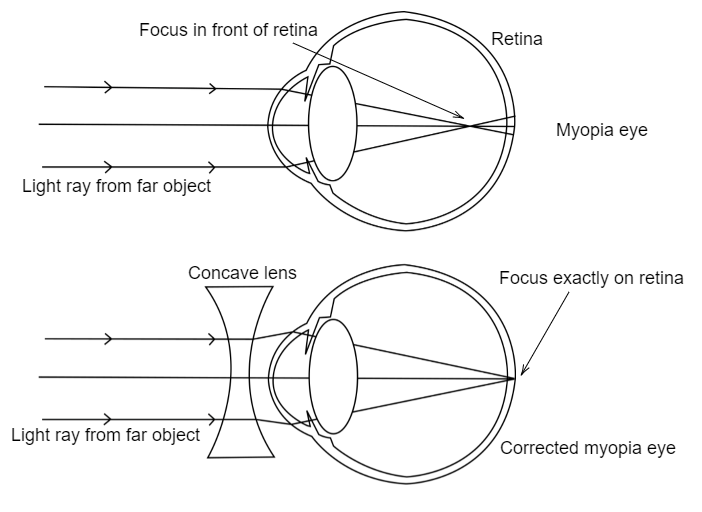
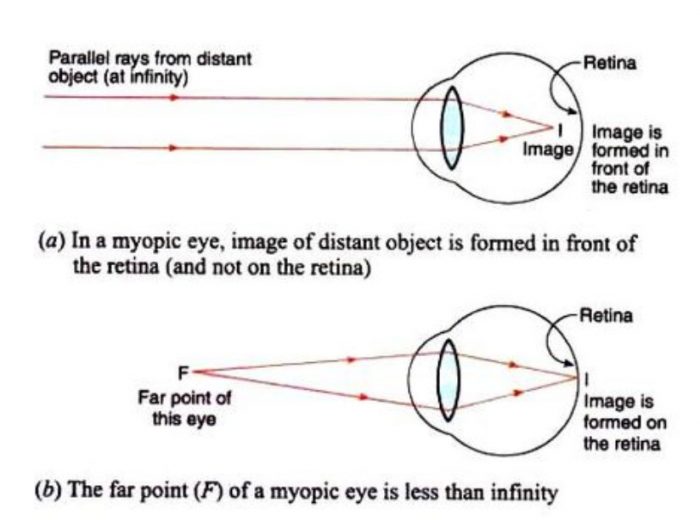



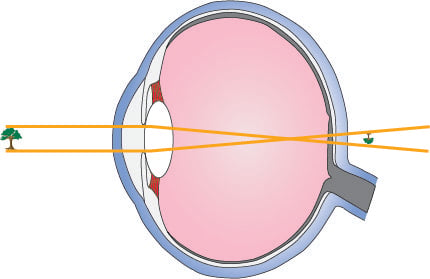
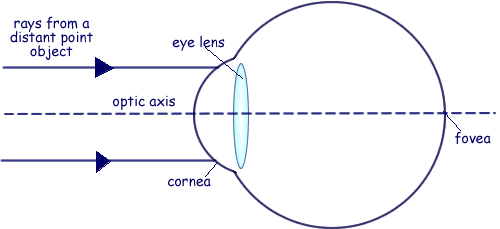









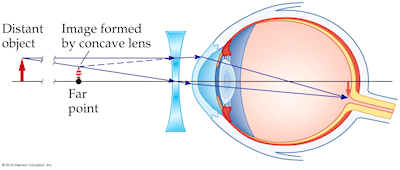





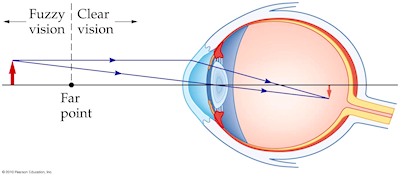



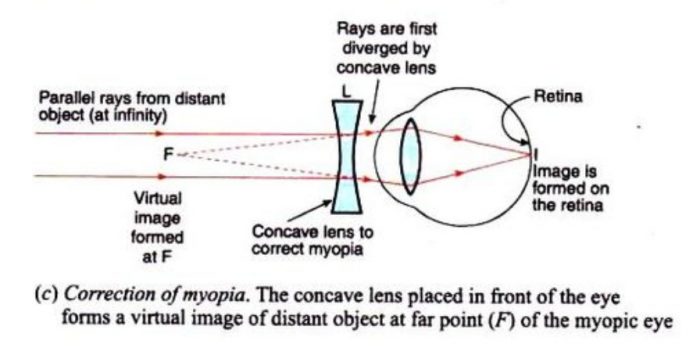

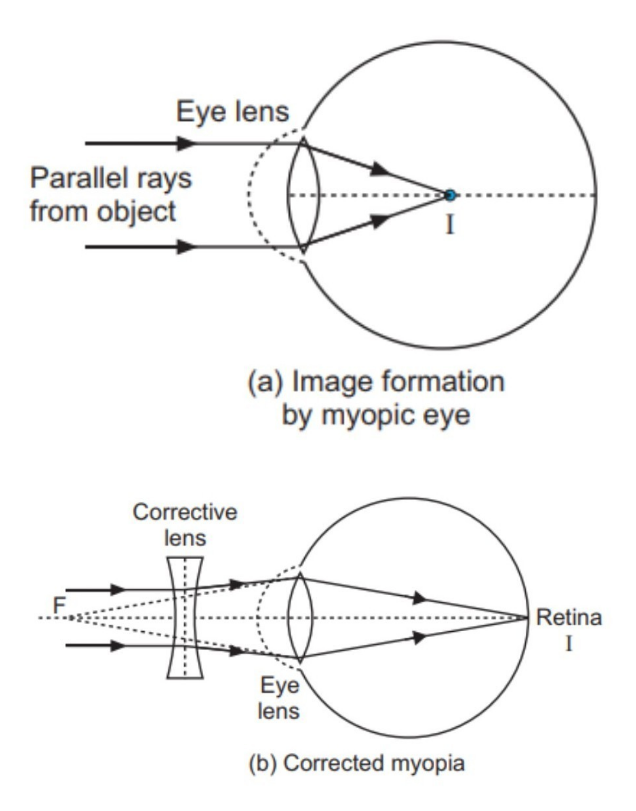

0 Response to "40 draw the ray diagram for nearsighted"
Post a Comment